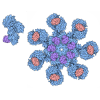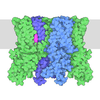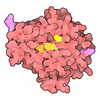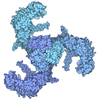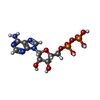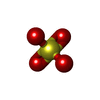[English] 日本語
 Yorodumi
Yorodumi- PDB-3eh9: Crystal structure of death associated protein kinase complexed wi... -
+ Open data
Open data
- Basic information
Basic information
| Entry | Database: PDB / ID: 3eh9 | ||||||
|---|---|---|---|---|---|---|---|
| Title | Crystal structure of death associated protein kinase complexed with ADP | ||||||
 Components Components | Death-associated protein kinase 1 | ||||||
 Keywords Keywords | TRANSFERASE / kinase catalytic domain glycine-rich loop / ANK repeat / Apoptosis / ATP-binding / Calmodulin-binding / Cytoplasm / Kinase / Nucleotide-binding / Phosphoprotein / Polymorphism / Serine/threonine-protein kinase | ||||||
| Function / homology |  Function and homology information Function and homology informationcellular response to hydroperoxide / regulation of response to tumor cell / positive regulation of autophagic cell death / DAPK1-calmodulin complex / Caspase activation via Dependence Receptors in the absence of ligand / defense response to tumor cell / calcium/calmodulin-dependent protein kinase activity / regulation of NMDA receptor activity / syntaxin-1 binding / extrinsic apoptotic signaling pathway via death domain receptors ...cellular response to hydroperoxide / regulation of response to tumor cell / positive regulation of autophagic cell death / DAPK1-calmodulin complex / Caspase activation via Dependence Receptors in the absence of ligand / defense response to tumor cell / calcium/calmodulin-dependent protein kinase activity / regulation of NMDA receptor activity / syntaxin-1 binding / extrinsic apoptotic signaling pathway via death domain receptors / positive regulation of autophagy / apoptotic signaling pathway / regulation of autophagy / cellular response to type II interferon / actin cytoskeleton / protein autophosphorylation / regulation of apoptotic process / calmodulin binding / protein phosphorylation / protein kinase activity / non-specific serine/threonine protein kinase / negative regulation of translation / intracellular signal transduction / postsynaptic density / positive regulation of apoptotic process / protein serine kinase activity / protein serine/threonine kinase activity / apoptotic process / negative regulation of apoptotic process / GTP binding / glutamatergic synapse / ATP binding / identical protein binding / nucleus / plasma membrane / cytoplasm Similarity search - Function | ||||||
| Biological species |  Homo sapiens (human) Homo sapiens (human) | ||||||
| Method |  X-RAY DIFFRACTION / X-RAY DIFFRACTION /  SYNCHROTRON / SYNCHROTRON /  MOLECULAR REPLACEMENT / Resolution: 1.7 Å MOLECULAR REPLACEMENT / Resolution: 1.7 Å | ||||||
 Authors Authors | McNamara, L.K. / Watterson, D.M. / Brunzelle, J.S. | ||||||
 Citation Citation |  Journal: Acta Crystallogr.,Sect.D / Year: 2009 Journal: Acta Crystallogr.,Sect.D / Year: 2009Title: Structural insight into nucleotide recognition by human death-associated protein kinase. Authors: McNamara, L.K. / Watterson, D.M. / Brunzelle, J.S. | ||||||
| History |
|
- Structure visualization
Structure visualization
| Structure viewer | Molecule:  Molmil Molmil Jmol/JSmol Jmol/JSmol |
|---|
- Downloads & links
Downloads & links
- Download
Download
| PDBx/mmCIF format |  3eh9.cif.gz 3eh9.cif.gz | 78.3 KB | Display |  PDBx/mmCIF format PDBx/mmCIF format |
|---|---|---|---|---|
| PDB format |  pdb3eh9.ent.gz pdb3eh9.ent.gz | 57.4 KB | Display |  PDB format PDB format |
| PDBx/mmJSON format |  3eh9.json.gz 3eh9.json.gz | Tree view |  PDBx/mmJSON format PDBx/mmJSON format | |
| Others |  Other downloads Other downloads |
-Validation report
| Arichive directory |  https://data.pdbj.org/pub/pdb/validation_reports/eh/3eh9 https://data.pdbj.org/pub/pdb/validation_reports/eh/3eh9 ftp://data.pdbj.org/pub/pdb/validation_reports/eh/3eh9 ftp://data.pdbj.org/pub/pdb/validation_reports/eh/3eh9 | HTTPS FTP |
|---|
-Related structure data
| Related structure data |  3ehaC  3f5gC  3f5uC  1jksS S: Starting model for refinement C: citing same article ( |
|---|---|
| Similar structure data |
- Links
Links
- Assembly
Assembly
| Deposited unit | 
| ||||||||
|---|---|---|---|---|---|---|---|---|---|
| 1 |
| ||||||||
| Unit cell |
|
- Components
Components
| #1: Protein | Mass: 33794.367 Da / Num. of mol.: 1 / Fragment: Protein kinase domain, UNP residues 2-285 Source method: isolated from a genetically manipulated source Source: (gene. exp.)  Homo sapiens (human) / Gene: DAPK1, DAPK / Plasmid: pASK-IBA3 / Production host: Homo sapiens (human) / Gene: DAPK1, DAPK / Plasmid: pASK-IBA3 / Production host:  References: UniProt: P53355, non-specific serine/threonine protein kinase | ||
|---|---|---|---|
| #2: Chemical | ChemComp-ADP / | ||
| #3: Chemical | | #4: Water | ChemComp-HOH / | |
-Experimental details
-Experiment
| Experiment | Method:  X-RAY DIFFRACTION / Number of used crystals: 1 X-RAY DIFFRACTION / Number of used crystals: 1 |
|---|
- Sample preparation
Sample preparation
| Crystal | Density Matthews: 1.92 Å3/Da / Density % sol: 35.84 % |
|---|---|
| Crystal grow | Temperature: 295 K / Method: vapor diffusion, sitting drop Details: .2 M ammonium iodide 2.2 M ammonium sulfate , VAPOR DIFFUSION, SITTING DROP, temperature 295K |
-Data collection
| Diffraction | Mean temperature: 100 K |
|---|---|
| Diffraction source | Source:  SYNCHROTRON / Site: SYNCHROTRON / Site:  APS APS  / Beamline: 21-ID-G / Wavelength: 0.97857 Å / Beamline: 21-ID-G / Wavelength: 0.97857 Å |
| Detector | Type: MARMOSAIC 300 mm CCD / Detector: CCD / Date: Aug 4, 2008 / Details: Be lenses |
| Radiation | Monochromator: Diamond 111 / Protocol: SINGLE WAVELENGTH / Monochromatic (M) / Laue (L): M / Scattering type: x-ray |
| Radiation wavelength | Wavelength: 0.97857 Å / Relative weight: 1 |
| Reflection | Resolution: 1.7→30 Å / Num. all: 29383 / Num. obs: 29383 / Observed criterion σ(I): -3 / Redundancy: 3.8 % / Biso Wilson estimate: 30.5 Å2 / Rmerge(I) obs: 0.066 / Net I/σ(I): 12.7 |
| Reflection shell | Resolution: 1.7→1.76 Å / Redundancy: 3.7 % / Rmerge(I) obs: 0.501 / Mean I/σ(I) obs: 4.08 / Num. unique all: 2895 |
- Processing
Processing
| Software |
| ||||||||||||||||||||||||||||||||||||||||||||||||||||||||||||||||||||||||||||||||||||||||||
|---|---|---|---|---|---|---|---|---|---|---|---|---|---|---|---|---|---|---|---|---|---|---|---|---|---|---|---|---|---|---|---|---|---|---|---|---|---|---|---|---|---|---|---|---|---|---|---|---|---|---|---|---|---|---|---|---|---|---|---|---|---|---|---|---|---|---|---|---|---|---|---|---|---|---|---|---|---|---|---|---|---|---|---|---|---|---|---|---|---|---|---|
| Refinement | Method to determine structure:  MOLECULAR REPLACEMENT MOLECULAR REPLACEMENTStarting model: PDB Entry 1JKS Resolution: 1.7→30 Å / Cor.coef. Fo:Fc: 0.963 / Cor.coef. Fo:Fc free: 0.943 / SU B: 2.132 / SU ML: 0.072 / Cross valid method: THROUGHOUT / ESU R: 0.119 / ESU R Free: 0.115 / Stereochemistry target values: MAXIMUM LIKELIHOOD / Details: HYDROGENS HAVE BEEN ADDED IN THE RIDING POSITIONS
| ||||||||||||||||||||||||||||||||||||||||||||||||||||||||||||||||||||||||||||||||||||||||||
| Solvent computation | Ion probe radii: 0.8 Å / Shrinkage radii: 0.8 Å / VDW probe radii: 1.2 Å / Solvent model: BABINET MODEL WITH MASK | ||||||||||||||||||||||||||||||||||||||||||||||||||||||||||||||||||||||||||||||||||||||||||
| Displacement parameters | Biso mean: 24.628 Å2
| ||||||||||||||||||||||||||||||||||||||||||||||||||||||||||||||||||||||||||||||||||||||||||
| Refinement step | Cycle: LAST / Resolution: 1.7→30 Å
| ||||||||||||||||||||||||||||||||||||||||||||||||||||||||||||||||||||||||||||||||||||||||||
| Refine LS restraints |
| ||||||||||||||||||||||||||||||||||||||||||||||||||||||||||||||||||||||||||||||||||||||||||
| LS refinement shell | Resolution: 1.7→1.743 Å / Total num. of bins used: 20
|
 Movie
Movie Controller
Controller


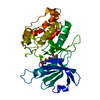
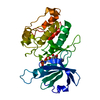
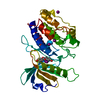
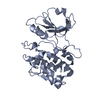

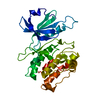
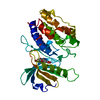
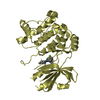
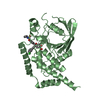
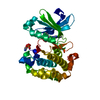
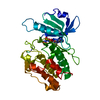
 PDBj
PDBj


